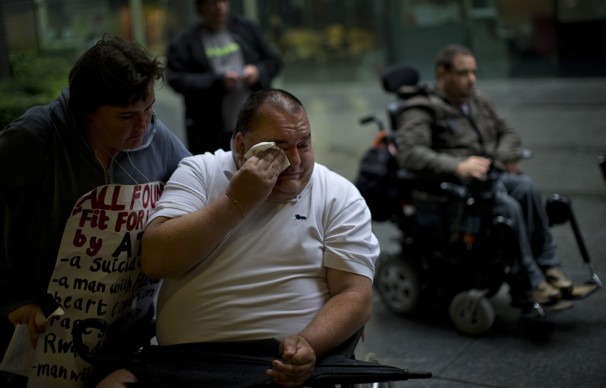

By Anthony Faiola, Published: August 29
LONDON — With an ode to science, human perseverance and the disabled physicist Stephen Hawking, this host city raised the curtain Wednesday on what is set to be the world’s biggest and most-watched Paralympics Games despite receiving relatively limited attention in the United States.
Two and half weeks after the close of the extraordinarily successful Games of the XXX Olympiad, the Paralympics opening ceremony marked a homecoming for an event that had its beginnings in the vision of Ludwig Guttmann, a German-born British doctor who, from his base at Stoke Mandeville Hospital at Aylesbury, sought to use sports as a physical and emotional balm for injured soldiers after World War II.
The expensive theatrics and brilliant pyrotechnics on Wednesday underscored just how far the event has come, with London staging a multimillion-dollar pageant drawing on everything from Shakespeare to the Big Bang. Disabled performers soared in the air on zip lines as Hawking, arguably the globe’s most celebrated living scientist, used his trademark voice box to deliver a metaphorical message: “Look upon the stars, and not down at your feet.”
On a day in which the Paralympic flame en route through London was delayed by two hours due to weather, the ceremonies — far more sober, if occasionally just as bewildering as the Olympic opener last month — paid lengthy and elaborate homage to the umbrella. The assembly of 4,300 athletes from 164 nations included renowned South African “blade runner” Oscar Pistorius, Britain’s Martine Wright, who lost both legs in the 2005 bombing of the London Underground, and Afghanistan’s sole paralympian, the taxi driver cum weightlifter Mohammed Fahim, a landmine victim who opened the parade as his national flag bearer.
“The games are returning to the country where they first began more than 60 years ago,” Queen Elizabeth II, who presided over Wednesday’s opening, said in a statement. Prince Harry, nude photos of whom were recently leaked, was noticeably absent. “We look forward to celebrating the uplifting spirit which distinguishes the Paralympic Games.”
The crowds lining the streets of London on Wednesday for the last laps of the Paralympic torch relay were admittedly thinner than those who turned out nearly a month ago for the start of the Summer Games. But in a country that surprised the globe by dropping all pretense of British reserve to go absolutely gaga for the Olympics, there has been a profound embrace of the Paralympics, too, with these games on the cusp of becoming the first ever to sell out.
These games are not without their controversy. British disabled groups are staging a series of demonstrations this week to highlight government cuts and benefit reassessments being carried out by Atos, a private contractor that is also a key sponsor of the London Paralympics. But even that appears not to have not dampened surging interest in the Paralympic competitions here. It is as if this nation, for whom the Olympics served as a temporary lift from the gloom of recession, simply cannot let go, remaining eager for every last drop of sweat and excitement it can wring out of the London Games.
London’s eccentric mayor Boris Johnson, a comedic landmark of the recently closed XXX Olympiad, vowed to show the world a further “festival of exertion and achievement” over the next 11 days: “To those who think they have had enough sport already and have reached satiety. As Margaret Thatcher almost once said, when it comes to the Olympics and Paralympics there is no such thing as satiety.”
Britain’s Channel 4, teasing the Games with creative, high-impact ads portraying paralympians as “superhumans,” will air more than 150 hours of coverage, including many competitions shown live during prime-time hours. A host of other nations are dramatically upping their coverage this year, with countries from Ireland to Australia offering live broadcasts and dozens of hours worth of programming.
In contrast, NBC will offer a relatively limited viewing experience in the United States, showing four-hour-long highlight shows on NBC Sports as well as a 90-minute special a week after the Paralympic Games end. The network will also offer daily online highlights via YouTube.
“If other countries — including Great Britain, China, Brazil and Australia — heavily broadcast these games, why can’t we?” Tony Pauls, father of a U.S. paralympic gold medalist, complained in an op-ed published in the Newark Star-Ledger. He added: “It is nearing the end of summer. College and pro football aren’t in full swing yet. Baseball’s regular season is winding down. Why is it that NBC will treat these athletes like — and I hate to say it — second-rate athletes?”
And yet, others involved in the Paralympics movement note coverage this year will, however limited, be greater than the virtually nonexistent offerings from Beijing in 2008. They also note that sponsors including Nike have gone out of their way to feature paralympians in commercial spots, something they see as a step forward in the recognition of disabled American athletes.
“We’re not going to jump from nothing to full coverage in the matter of one Games,” said Dana Fink, a 24-year-old Washingtonian who narrowly missed making the U.S. Paralympics rowing team. “But we are going to be watching the online coverage, and we’re going to get excited about these Games anyway. And I hope the numbers watching will show that Americans really do want to watch their athletes with disabilities win, too.”
Karla Adam contributed to this report.

